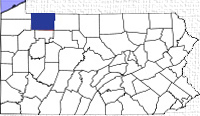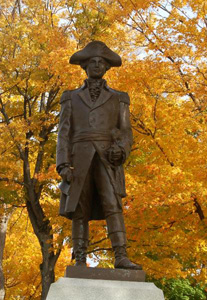

 |
 |
 |
||
Part of the PAGenWeb Project |
||||
Warren was formed from parts of Allegheny and and Lycoming counties on March 12, 1800, by an act of the state legislature. That same act attached Warren County along with newly formed Mercer, Venango, and Erie counties to Crawford County "until an enumeration of the taxable inhabitants within the aforesaid counties respectively shall be made, and it shall be otherwise directed by law." On April 1, 1805, Warren County was separated from Crawford and annexed to Venango County.
It was not until March 16, 1819, that an act was passed providing for the separate and independent organization of Warren County. So if you cannot find your ancestors in Warren County, your family genealogy may await you in Allegheny, Lycoming, Crawford, or Venango counties. And if not there, you might take a look at Northumberland County!
The city of Warren, the county seat, was laid out in 1795.
This county has long been known for its oil and timber operations and is the site of the Cornplanter Indian Grant.
"Warren County was named for General Joseph Warren, a distinguished and gallant soldier who lost his life at Bunker Hill while boldly defending his country's rights. The Daughters of the Revolution have erected a monument to General Warren in the Public Square in Warren, Penn. (View the square before the monument.)
DAR monument in the General Joseph Warren Park, Warren, Pennsylvania
General Joseph Warren

Photo Copyright Allegheny Almanac
This section of the County owes much to the foresight and labors of General William Irvine, one of the early settlers of the valley. He obtained a warrant for a large tract of land on the backs of the Allegheny River. His son Callender Irvine perfected title to the same as required by law by actually living on and improving the lands. Much of the original tract is still owned by the descendants of old General Irvine. The splendid forests of Pine and Hemlock which covered the hills were one of the chief attractions which brought settlers and speculators to this valley. Small mills were erected and their products carried by water to distant markets, --some going as far away as New Orleans and this started an enterprise which laid the foundation of much of the wealth of the population of Warren County."
From the book Genealogical Gleanings of Siggins, and other Pennsylvania Families A Volume of History, Biography and Colonial, Revolutionary, Civil and Other War Records Including Names of Many Other Warren County Pioneers, compiled by Emma Siggins White, assisted by Martha Humphreys Maltby, excerpts pages 14 -15; published by Tiernan-Dart Printing Co., 1918. (To aid in finding your ancestor, names above have been bolded.)
On May 9, 2011, the statue of General Warren was rededicated. Read more from the Warren Times Observer.
See also the General Joseph Warren Chapter, Daughters of the American Revolution (DAR).
1800 - County erected and surveyed
1819 - Organized for judicial and municipal purposes
1819 - First court held, the Hon. Jesse Moore, president judge; Isaac Connelly and Joseph Hackney, associate judges
1824 - The Honorable Henry Shippen appointed president judge
1824 - Trial of Jacob Hook for the murder of Caleb Wallace
1827 - The first courthouse was erected
1829 - The first jail built
1830 - The steamboat, Allegheny, built mainly by Archibald Tanner, of Warren, and David Dick, of Meadville, opened steamboat navigation on the Allegheny river up to Warren, making one and the only trip ever made by steam to Olean, New York.
1832 - Warren borough, with a population of 358, was incorporated by act of the Legislature.
1834 - The Warren academy built with the aid of a State appropriation.
1834 - The Lumbermen's bank of Warren was chartered, organized, and opened with a paid-up capital stock of $100,000 with Robert Falconer as president and Fitch Shepard, cashier.
1835 - Warren county taken out of hte Sixth Judicial District and made part of the Eighteenth District, with N.B. Eldred appointe president judge.
1837 - The Sunbury and Erie (later named the Philadelphia and Erie railway, was chartered and organized
1838 - Sunbury and Erie railroad surveyed and located through Warren county.
1838 - Lumbermen's bank failed.
1839 - The first bridge across the Allegheny river was built at Warren.
1839 - Alexander McCalmont succeeded N.B. Eldred as president judge of Warren County
1840 - Warren county restored to the Sixth District and a district court was created for five years; James Thompson appointed judge.
1843 - Gaylord Church succeeded Judge Alexander McCalmont
1851 - The Honorable John Galbraith elected president judge.
1856 - As assistant judgeship was created for the Sixth District (including Warren) and was filled by David Derrickson for the first ten years.
1856 - The Warren county bank was chartered.
1857 - Sunbury and
Erie railroad enterprise was revived after almost twenty years of suspension owing to the failure of the United States bank.
1859 - Sunbury and Erie railroad western division from Erie to Warren was completed in the fall.
1860 - On the death of Judge Galbraith, the vacancy was filled by the appointment of R. Brown; he was succeeded by the election of S.P. Johnson that same year.
1861 - The Warren county bank, now named the North-western Bank of Warren, failed.
1863
- Sunbury and Erie railroad line to Sunbury was completed.
1866 - John P. Vincent succeeded David Derrickson as assistant judge.
1867 - The Warren and Franklin railroad, from Irvineton to Oil City, was completed.
1870 - The Sixth District, long composed of Erie, Crawford, and Warren counties, was changed; L.D. Wetmore was elected for the district, including Warren county.
1871 - Dunkirk and Warren railroad was built between Dunkirk and Warren.
1872 - The Warren and Venango road, from Warren to Titusville, was built.
1872 - A new suspension bridge over the Allegheny river was erected at Warren.
1873 - A new suspension bridge over the Allegheny river was built at Tidioute.
1873 - The Western Insane Hospital was located in the Conewango valley, two miles north of Warren borough
1874 - A new and commodious jail was built.
1876 - The old court house was torn down and a new one commenced on the same ground, abet with "modern style and conveniences."
Source: An Illustrated History of the Commonwealth of Pennsylvania, Civil, Political, and Military, from its Earliest Settlement to the Present Time, by William Henry Egle, published by De Witt C. Goodrich and Co., Harrisburg, 1876; pages 1138-1139. (Courtesy of Google Books)
April 25, 1894 - A FEW REMINISCENCES Of Warren's Early History by an Old Resident, from the Evening Democrat.
March 12, 1900 - under "BREVITIES" in the Monday edition of the Evening Democrat, page four:
--One hundred years ago today the counties of Butler, Beaver, Mercer, Erie, Crawford, Venango, Armstrong and Warren were formed. The new counties were formed from the territory previously embraced by Westmoreland, Washington, Allegheny and Lycoming counties. The first courts of the new counties were held at held [sic] at Meadville. The people of today can hardly realize the vicissitudes experienced by the pioneers who when summoned to attend court or having legal business to perform were obliged to undertake a journey of 75 or 100 miles through dense forests and over Indian trails that were winding and overgrown with a rank growth of underbrush. The same act that formed the county provided the town of Warren as the county seat and appointed three commissioners. These first county commissioners were William Miles, Thomas Miles and John Andrews, but just what the duties of these commissioners seem to have been the act does not state. From this humble begining [sic] the county had its birth and today is one of the most populous and wealthy of any of the counties created at that time. The excellent opportunities offered the settlers in the county brought a hardy lot of people who laid the foundations of the county as it stands today.
H I S T O R Y OF WARREN COUNTY PENNSYLVANIA WITH ILLUSTRATIONS AND BIOGRAPHICAL SKETCHES OF SOME OF ITS PROMINENT MEN AND PIONEERS |
Edited by J.S. Schenck, assisted by W.S. Rann; Syracuse, N.Y.; D Mason & Co., Publishers; 1887 |
CHAPTER I. |
OUR SUBJECT SOMEWHAT EXPLAINED. |
Webmaster's note:Selected excerpts from pages 13 - 14.
|
Warren county was not organized as a separate shire until the year 1819. |
Material for submission, questions, or comments should be directed to the Warren County coordinator.
Return to Warren County Genealogy homepage
A proud participant in the USGenWeb and PAGenWeb Projects
© 2010 - 2021 Penelope Repko and contributors
© 2008 - 2009 Bill Klauk and contributors